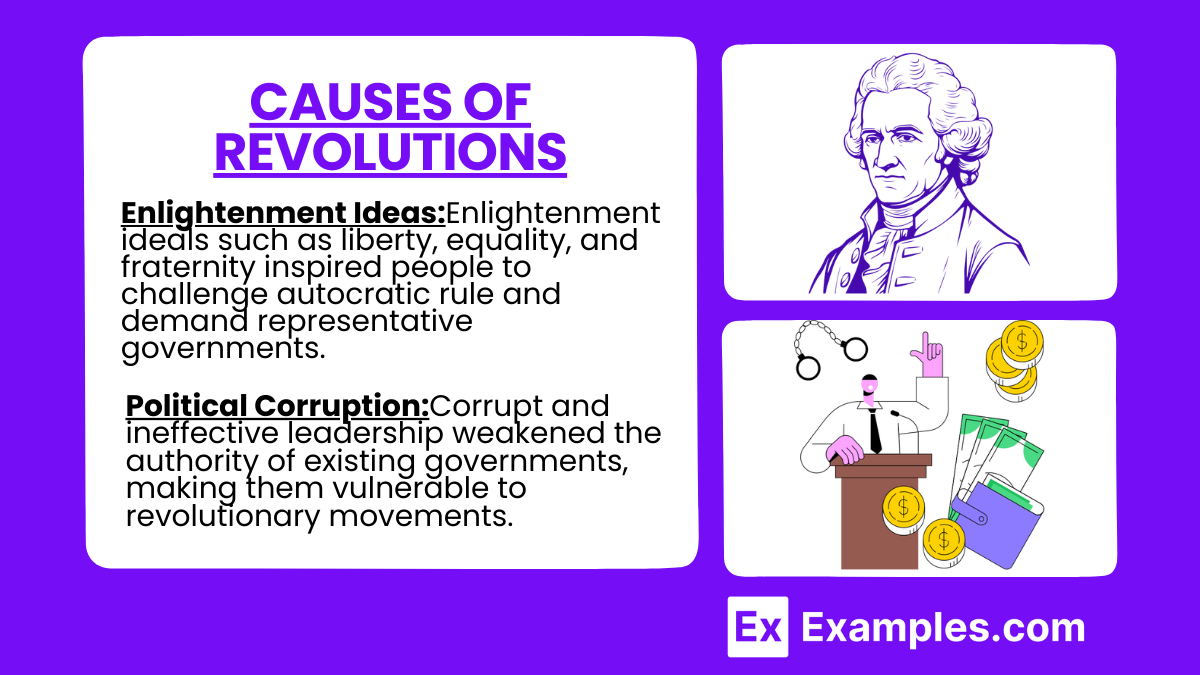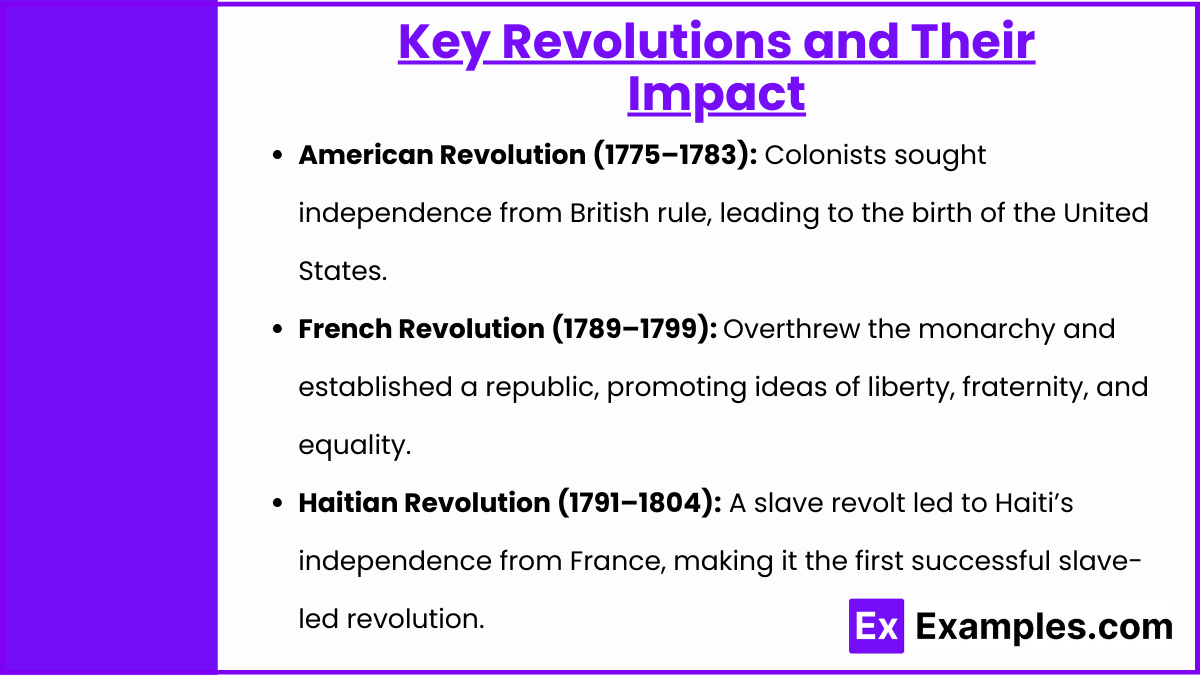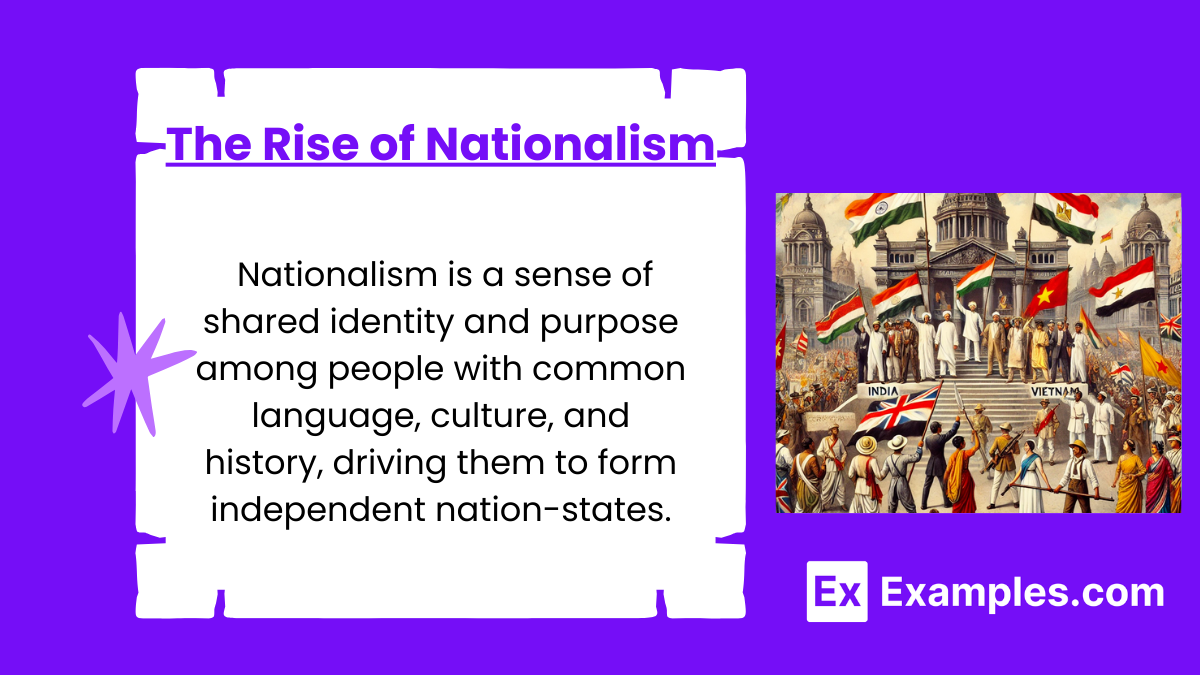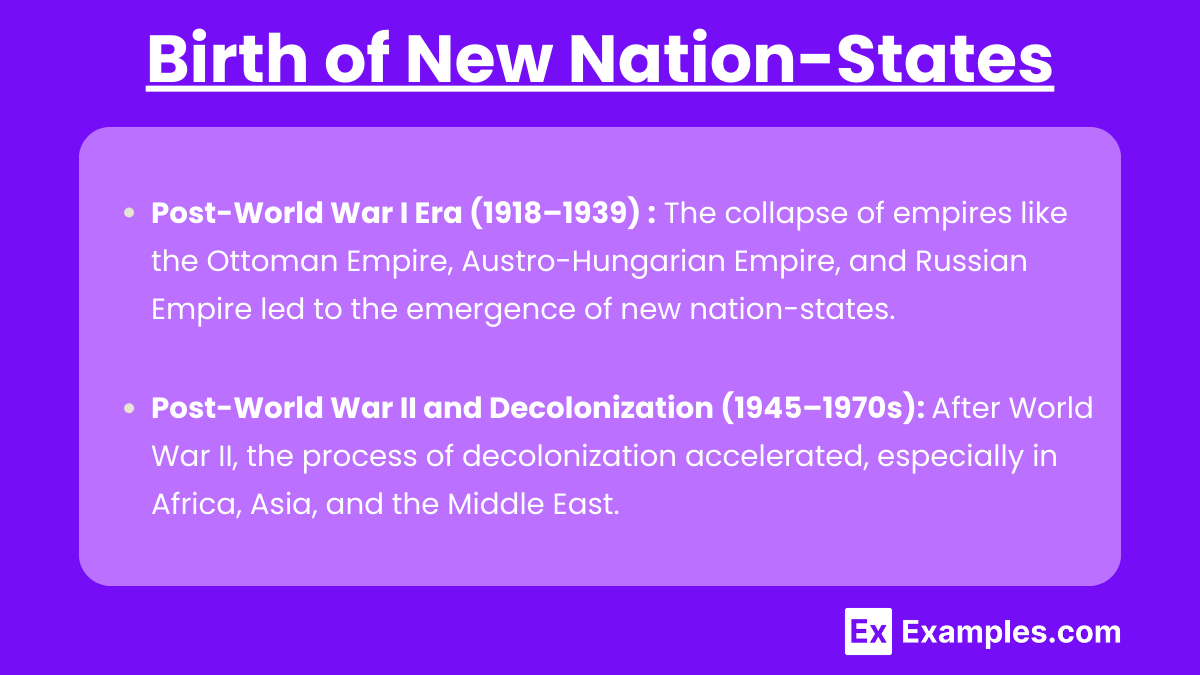The period of revolutions against existing governments marked a transformative era, where Enlightenment ideas, economic hardships, and social inequalities fueled uprisings. Key revolutions like the American, French, Haitian, and Latin American movements challenged monarchies and colonial powers, leading to the birth of new nation-states. These revolutions spread ideals of liberty, nationalism, and self-determination, reshaping global political landscapes.
Learning Objective
In studying “Revolutions Against Existing Governments and the Birth of New Nation-States” for AP World History: Modern, you should learn to identify the causes of major revolutions, including social inequality, economic hardship, and demands for political change. Analyze the key events, leaders, and ideologies that fueled revolutionary movements and evaluate their outcomes in the formation of new nation-states. Explore the global influence of these revolutions on political ideologies, governance, and independence movements. Additionally, consider the challenges faced by newly-formed nations, including issues of legitimacy, governance, and nation-building.
1. Causes of Revolutions

- Enlightenment Ideas: Enlightenment ideals such as liberty, equality, and fraternity inspired people to challenge autocratic rule and demand representative governments.The Enlightenment was an intellectual movement in the 17th and 18th centuries that emphasized reason, individual rights, and the pursuit of knowledge. Central to this period were ideals such as liberty, equality, and fraternity, which encouraged people to question traditional forms of authority like monarchies and autocratic rule.
- Political Corruption: Corrupt and ineffective leadership weakened the authority of existing governments, making them vulnerable to revolutionary movements.Political corruption during the pre-revolutionary periods often involved leaders prioritizing their personal interests over the welfare of their citizens. Ineffective governance, coupled with favoritism, bribery, and misuse of public funds, eroded public trust and weakened the legitimacy of governments. This lack of accountability and transparency led to widespread dissatisfaction, particularly among the middle and lower classes, who felt neglected or oppressed by their rulers. Corrupt leadership not only failed to address critical societal issues such as economic inequality and social justice, but also became blind to the growing unrest among the populace.
2. Key Revolutions and Their Impact

- American Revolution (1775–1783):
- Colonists sought independence from British rule, leading to the birth of the United States.
- Inspired other revolutionary movements globally by demonstrating that colonies could successfully overthrow a colonial power.
- French Revolution (1789–1799):
- Overthrew the monarchy and established a republic, promoting ideas of liberty, fraternity, and equality.
- Radical phases led to the Reign of Terror and later the rise of Napoleon Bonaparte, who spread revolutionary ideals across Europe.
- Haitian Revolution (1791–1804):
- A slave revolt led to Haiti’s independence from France, making it the first successful slave-led revolution.
- Demonstrated the possibility of overturning colonial and slave-based systems, influencing other colonies in Latin America.
3. The Rise of Nationalism

- Definition: Nationalism is a sense of shared identity and purpose among people with common language, culture, and history, driving them to form independent nation-states.
- Impact on Europe: The unification movements in Italy and Germany in the 19th century emerged from nationalist sentiment, consolidating fragmented regions into single nation-states.
- Nationalist Movements in Asia and Africa: As European colonial empires expanded, nationalist movements in colonies like India, Egypt, and Vietnam began to demand independence, setting the stage for 20th-century decolonization.
4. Birth of New Nation-States

- Post-World War I Era (1918–1939): The collapse of empires like the Ottoman Empire, Austro-Hungarian Empire, and Russian Empire led to the emergence of new nation-states, particularly in Eastern Europe and the Middle East.
- Post-World War II and Decolonization (1945–1970s): After World War II, the process of decolonization accelerated, especially in Africa, Asia, and the Middle East. Many European colonial powers relinquished control over their colonies.
Examples
Example 1: American Revolution (1775–1783)
The American colonies revolted against British rule, seeking independence. This led to the creation of the United States and inspired future revolutionary movements worldwide.
Example 2: French Revolution (1789–1799)
French citizens overthrew the monarchy, establishing a republic. It spread ideas of liberty and equality, influencing political change across Europe and Latin America.
Example 3: Haitian Revolution (1791–1804)
Enslaved Africans in Haiti revolted against French colonial rule, resulting in independence. This was the first successful slave-led revolution, challenging colonialism and slavery.
Example 4: Latin American Wars of Independence (1808–1825)
Inspired by Enlightenment ideas, countries like Venezuela, Argentina, and Mexico fought for independence from Spain, leading to the formation of independent Latin American states.
Example 5: Greek War of Independence (1821–1830)
Greeks revolted against the Ottoman Empire’s rule, seeking autonomy. This successful struggle inspired nationalist movements in Europe, reshaping the region’s political landscape.
MCQs
Question 1
Which of the following revolutions was the first successful slave-led rebellion that resulted in the establishment of an independent nation?
A) American Revolution
B) French Revolution
C) Haitian Revolution
D) Latin American Wars of Independence
Answer: C) Haitian Revolution
Explanation: The Haitian Revolution (1791–1804) was the first and only successful slave-led rebellion that led to the creation of an independent nation, Haiti. It was led by enslaved Africans who fought against French colonial rule. This revolution inspired other movements against colonialism and slavery, showcasing the possibility of overthrowing oppressive regimes.
Question 2
Which revolution directly influenced the rise of nationalism and the unification movements in Europe, particularly in Italy and Germany?
A) American Revolution
B) French Revolution
C) Greek War of Independence
D) Latin American Wars of Independence
Answer: B) French Revolution
Explanation: The French Revolution (1789–1799) introduced the ideals of liberty, equality, and fraternity, inspiring the concept of nationalism. This influence led to unification movements across Europe, especially in Italy and Germany, where people sought to form nation-states based on shared cultural and historical identities. The revolution’s impact extended beyond France, reshaping European political thought.
Question 3
Which of the following events marked the beginning of independence movements across Latin America?
A) American Revolution
B) Greek War of Independence
C) French Revolution
D) Napoleonic Wars
Answer: D) Napoleonic Wars
Explanation: The Napoleonic Wars (1803–1815) weakened Spain and Portugal’s control over their colonies, creating opportunities for independence movements across Latin America. Influenced by Enlightenment ideas and inspired by the French and American revolutions, leaders like Simón Bolívar and José de San Martín led successful campaigns to establish independent nation-states in Latin America.


